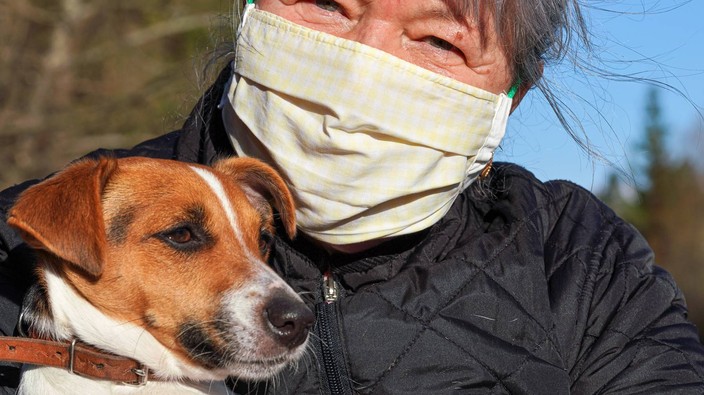the covid-19 in mammals other than humans is nothing new. in fact, it is believed the virus emerged from an animal reservoir as a zoonotic pathogen (meaning it can be transferred between animals and humans), and we have seen covid-19 spread quickly in
mink populations in denmark and
gorillas in zoos. there have also been
reports of dogs catching the virus.despite these findings, not much has been uncovered about the frequency and risk factors associated with the spread of sars-cov-2 (the virus that causes covid-19) between humans and pets within a household until now — and findings suggest that dogs can in fact contract the virus from their humans.the
study, published on the biorxiv server, collected data from a sampling of dogs in washington state and idaho and analyzed several human and animal demographic variables, features of their shared environment, blood collection from animals for serology for anti-sars-cov-2 antibodies and nasal pcr tests.the researchers analyzed 67 dogs from 46 households. the nasal pcr tests to determine whether a dog had covid-19 was available for 58 of the dogs while the serological test for antibodies was available in 51 dogs. they found clinical signs consistent with covid-19 in 14 of the dogs (23.7 per cent) and sars-cov-2 antibodies were present in 22 dogs (43.1 per cent). however, all the pcr tests came back negative.respondents to the survey indicated close contact between the dogs and their owners within the household and there were positive trends found with dogs who shared beds with humans and the number of sars-cov-2 positive humans in the household. while no statistically significant occurrences were detected between human-animal contact variables and either seropositivity or covid-19 like illness in dogs, the respondents did reportedly adopt measures to mitigate human-to-animal transmission of sars-cov-2 following diagnosis.there was also a strong correlation between dogs that displayed symptoms of covid-19 and seropositivity in those dogs.“these data indicate that human-to-animal transmission of sars-cov-2 in households is common, in a study population characterized by close human-animal contact,” the researchers wrote. and they added that the study also indicates infected pets can often show symptoms of “covid-like illness”.the authors note that while the pcr tests did not show positive results, it could be due to a delay in sampling.
enjoying this story? subscribe to our newsletter here
and the fact that household members were taking precautions to protect pets from sars-cov-2 infection indicates an opportunity to implement more measures to decrease transmission of sars-cov-2 between humans and animals sharing households. studies such as this also bring to light that zoonotic diseases are not an exclusively human problem, and that future diseases may require an approach that aims to protect all species, not just us.“as vaccine roll-out continues and human-to-human transmission wanes, and in preparation for the next pandemic of zoonotic origin, rigorous characterization of the nature of human-animal contact within households, and the implications of this contact for disease transmission, is critical,” the researchers wrote.
nick beare is a writer for healthing.ca.
 2 minute read
2 minute read








